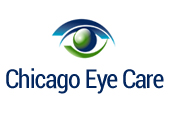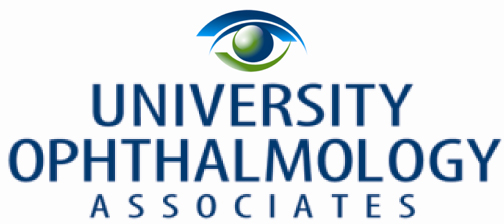The University Ophthalmology Associates have decades of experience treating corneal diseases and external diseases of all kinds. Trusted for over 80 years, our dedicated team of doctors can identify and treat most corneal disorders, prescribe medicines, and carry out eye surgeries. Our three convenient greater Chicago ophthalmology offices are experts at diagnosing eye diseases and corneal problems, including:
- Corneal dystrophies.Often a progressive, genetic eye disorder, corneal dystrophies are abnormal accumulations of material in the cornea. While these may not present immediate symptoms, many corneal dystrophies lead to vision impairment due to a reduction in the cornea’s transparency, including blurry vision or overall vision loss. University Ophthalmology Associates treat Skokie corneal dystrophies with a variety of methods, including eye drops, lasers, or corneal transplants.
- Corneal ulcers. Corneal ulcers, which can be characterized as bacterial ulcers, fungal infections, or keratitis, need to be treated with urgent care to prevent rapid loss of vision. A corneal ulcer can be often be visible, featuring a swollen appearance and fluid discharge, and may be accompanied by discomfort that can feel like the presence of a foreign object in the eye or a pain similar to that of a toothache. Our Skokie ophthalmologists are available and experienced at treating corneal ulcers of all kinds.
- Keratoconus. A progressive eye disease, keratoconus occurs when the cornea transforms from a round shape to a cone shape, causing vision distortion as light entering the eye is deflected. This condition can lead to nearsightedness, astigmatism, and light sensitivity. University Ophthalmology Associates can screen for and treat keratoconus through eyeglasses, contact lenses, or corneal transplants.
- Dry eye syndrome. As the name suggests, dry eye syndrome is a chronic condition that often leaves one with frequent dry eyes. Our Libertyville ophthalmologists can treat and prescribe methods of tear production, conserving tears, or adding tears through prescription-strength eyedrops.
- Conjunctival tumors. Tumors that grow on the surface of the eye can be malignant or benign. While most conjunctival tumors don’t have symptoms outside of their outward appearance, the board-certified medical practitioners at University Ophthalmology Associates can get these tumors identified and treated with urgency and care.
- Corneal transplants. Also known as keratoplasty, a corneal transplant replaces a portion of your cornea with a donor’s corneal tissue. Often performed for patients experiencing vision problems due to a scarred, thinned, or cloudy cornea, the donor cornea is transplanted into your cornea to restore vision and reduce pain. The University Ophthalmology Associates perform keratoplasty procedures of all kinds, including:
- Penetrating keratoplasty. In this method, a piece of your cornea is removed and a portion of the donor cornea is sewn into your cornea’s opening.
- Lamellar keratoplasty. An option that includes fewer complications and a faster recovery time, the inner or outer layers of the cornea are replaced instead of all of the cornea’s layers.
- Descemet’s stripping endothelial keratoplasty. Considered the gold standard for corneal disease treatment, this method involves a small incision that only replaces the affected part of the cornea.
- Boston Keratoprosthesis. When keratoplasty methods fail or are not possible, the Boston Keratoprosthesis replaces a cornea with an artificial cornea.
- Limbal stem cell transplants. Using stem cells from a healthy eye, a Limbal stem cell transplant can repair damage to the cornea caused by damage to the eye.
- Pterygium excision. Also known as surfer’s eye, pterygium leads to the growth of fleshy pink tissue on the whites of an eye. This condition often affects people who spend lots of time outdoors. The University Ophthalmology Associates are experienced at performing Chicago pterygium surgery to remove the growth and restore the eye’s normal appearance.
- Complex cataracts. University Ophthalmology Associates are also experienced in carrying out complex cataracts surgeries. For patients who have existing trauma or eye conditions like Uveitis, corneal astigmatism, corneal transplants, or refractive surgery, experienced Skokie ophthalmologists are necessary to perform highly technical and complex procedures.
- Intraocular lens exchange. An alternative to laser surgery to patients experiencing farsightedness, intraocular lens exchange replaces the patient’s natural lens with an artificial lens. This procedure is often one of the most effective ways to correct certain vision problems.
- Lens dislocation repair. A complete or partial dislocated lens can lead to opaqueness or uncontrollable glaucoma. Our Libertyville ophthalmologists can diagnose the best treatment method going forward to remove or treat a dislocated lens.
If you’re experiencing eye discomfort or need to have a Skokie ophthalmologist examine your eye condition, let the University Ophthalmology Associates treat your symptoms. Call the Chicago ophthalmologists at (312) 942-2734, the Skokie ophthalmologists at (847) 677-8989, or the Libertyville ophthalmologists at (847) 677-8989 to schedule an eye care appointment today!



